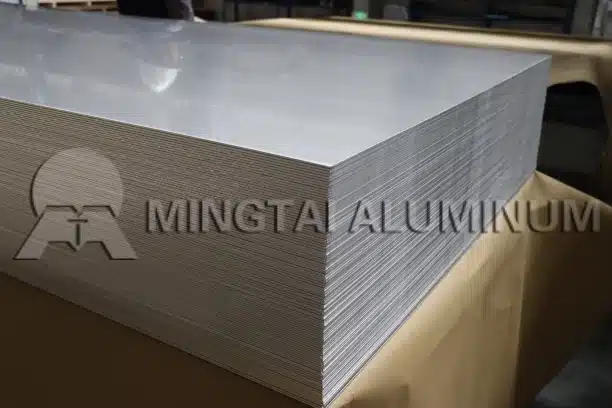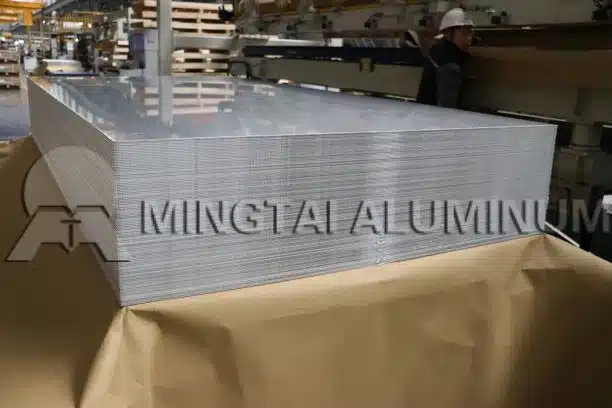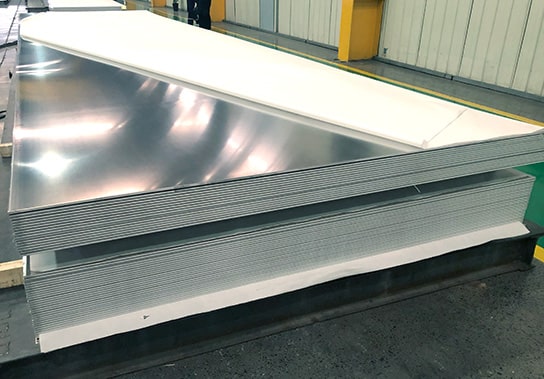Overview of Sheet Metal Fabrication
Sheet metal fabrication is a flexible and vital method in today’s manufacturing. It turns flat metal sheets into different parts by cutting, bending, and joining techniques. Many industries rely on this process. These include automotive, aerospace, construction, and electronics. Aluminum sheet metal is a top pick for projects. Why? It’s light, resists rust, and shapes easily.

The Stamping Process for Aluminum
What Is Metal Stamping?
Metal stamping is a production method. It uses dies and powerful machines to form or cut metal sheets into specific shapes. This approach works well for making lots of parts with steady quality. Aluminum sheet metal is often stamped. It creates items like car panels, electronic casings, and structural pieces.
Key Factors in Stamping Aluminum
Material Properties of Aluminum
Aluminum has special traits that make it great for stamping. It’s a light metal with good flexibility, electrical flow, heat transfer, and resistance to heat and radiation. These qualities let aluminum sheets bend easily during stamping. They keep their strength too. Also, aluminum blends are made by adding elements to boost traits like durability and rust resistance. For example:
- 3003-H14 Aluminum Sheet: Noted for great welding and rust resistance. It’s perfect for fuel tanks and trailer sides. (ASTM-B209, QQ-A-250/2)
- 5052-H32 Aluminum Sheet: Gives better rust resistance and shaping ability. It suits marine gear and chemical tanks. (ASTM B209, QQ-A-250/8)
- 6061-T651 Aluminum Sheet: Mixes extra strength with easy machining. It’s widely used in frames and car parts. (ASTM B209, QQ-A-250/11)
Importance of Aluminum Thickness in Stamping
The thickness of aluminum sheets matters a lot in stamping. Thin sheets form easily but may not be strong enough for some uses. Thicker sheets offer more toughness. However, they need more force to stamp. Typical thicknesses range from 0.8mm to 1.2mm for top-quality metal roofing. Picking the right thickness ensures great results. It also cuts down on waste.
Tools and Techniques for Stamping Aluminum
Equipment Used in Aluminum Stamping
Die Materials and Their Role in Stamping
Dies are key tools in stamping. They shape or cut aluminum sheets with precision. The material of the die affects part quality and tool life. High-carbon steel or carbide dies are common. They’re chosen for their hardness and wear resistance.
For general cutting tasks with aluminum blends, special face milling tools work well. They have a 45° angle and blades made for aluminum. This setup boosts efficiency and keeps accuracy.
Press Machines for Aluminum Sheet Metal
Press machines provide the force to stamp aluminum sheets into shapes. Hydraulic presses are popular. They give steady pressure across the piece. Mechanical presses are used too. They’re ideal for fast production.
Techniques to Improve Stamping Efficiency
Several methods can enhance stamping:
- Lubrication: Using lubricants lowers friction between the die and sheet. This prevents surface scratches.
- Progressive Dies: These allow multiple steps, like cutting and shaping, in one cycle.
- Finite Element Analysis (FEA): This software tests the process beforehand. It spots issues early.
- Proper Material Selection: Picking blends like 6061-T651 ensures strength and easy machining.
By using these tools and methods well, makers get precise results. They also cut costs from waste or machine downtime.
Customization Options for Sheet Metal Thickness
Standard Thickness Ranges
Aluminum sheet metal comes in many standard sizes for various needs. Common thicknesses range from 0.8mm to 1.2mm for quality roofing systems. These sizes work well for light yet strong uses, like car panels and aerospace parts.
For instance, 3003-H14 sheets excel in welding and rust resistance. They’re used in trailer sides and roofing. Likewise, 5052-H32 sheets resist rust well. They’re great for marine gear and chemical tanks.
Custom Thicknesses
Standard sizes are common, but some projects need custom options. Makers like MINGTAI ALUMINUM focus on custom sheets. MINGTAI ALUMINUM is a big company in China. It processes aluminum sheets. They can make 4x8 sheets in different thicknesses per customer needs. This flexibility helps industries use materials wisely. It meets unique design and performance goals too.
Material Considerations
The choice of material affects the needed thickness. Different aluminum types offer varied strength, rust resistance, and shaping ability:
- 3003 Aluminum: Known for a smooth finish and good rust resistance.
- 5052 Aluminum: Shapes well and suits tough settings.
- 6061 Aluminum: Blends strength and easy machining. It’s ideal for structural uses.
For example, 6061-T651 sheets are common in frames. They’re strong and easy to machine.
Tolerances and Precision
Precision is key in fields like aerospace and electronics. Even small errors can affect performance. Aluminum sheet makers follow strict rules for consistency. Advanced methods like laser cutting and CNC machining control thickness well.
All super-large and super-thick 7075 sheets are checked with ultrasound. This ensures no flaws or impurities. It guarantees top quality for uses like aircraft making.
Impact on Efficiency and Production
The thickness of aluminum sheets impacts production speed. Thin sheets stamp easily but may need extra support when joined. Thicker sheets give more strength. Yet, they take more energy to cut or bend.
The 7075 sheet conducts heat well. This cuts molding time and boosts work speed. Such traits make it a smart pick for industries aiming to save time without losing quality.
Application-Specific Thickness Optimization
Different applications need specific thicknesses:
- Automotive Industry: Needs light materials like thin sheets to boost fuel savings.
- Aerospace Industry: Requires thicker sheets for strength while keeping weight low.
- Construction Sector: Uses medium sheets for toughness in roofing or cladding.
By adjusting thickness to the use, makers balance performance and cost.
Cost-Efficiency Balance
Choosing the right thickness weighs cost against function. Thin sheets cut material costs. However, they may not be tough enough for some uses. Thicker sheets are sturdy but raise raw material costs.
Aluminum blends, made by adding metals, boost traits like strength and rust resistance. This means even thin sheets can work well when mixed right.

Advantages of Choosing MINGTAI ALUMINUM for Aluminum Sheet
MINGTAI ALUMINUM is a trusted supplier of quality sheets. We offer many custom options. The company has earned several certifications. These show our focus on quality:
MINGTAI ALUMINUM has certifications like ISO 9001 Quality Management System, ISO 14001 Environmental Management System, ISO 45001 Occupational Health and Safety Management System, ISO 50001 Energy Management System, GJB Military Equipment Quality Management System, EU CE Certification, GRS Global Recycled Standard 4.0, and Product Carbon Footprint Certification.
These prove MINGTAI ALUMINUM’s commitment to green practices and global standards. Also:
- We offer grades like 3003-H14, 5052-H32, and 6061-T651.
- Our modern facilities control sheet thickness precisely.
- Customers get custom solutions. These optimize performance and cost across industries.
By contacting MINGTAI ALUMINUM, businesses get expertly made materials. These boost output and meet strict quality standards.
FAQ
Q: What is the typical thickness range for aluminum sheets in stamping?
A: Common thicknesses for aluminum sheets in stamping range from 0.8mm to 1.2mm, especially for high-quality uses like metal roofing. This range works well for applications needing light yet strong materials, such as car panels and aerospace parts.
Q: Can thicker aluminum sheets be stamped?
A: Yes, thicker sheets can be stamped! They offer more durability but need more force from press machines. The exact thickness depends on the project, equipment, and aluminum type. For example, thicker sheets suit structural uses in aerospace or construction.
Q: Are thinner aluminum sheets easier to stamp?
A: Yes. Thinner sheets, like those around 0.8mm, form easily during stamping. However, they may lack strength for some uses. You might need extra support when joining them in assembly.
Q: What’s the thickest aluminum that can be stamped?
A: There’s no strict limit—it depends on the press machine, die strength, and aluminum type. Thicker sheets, like super-thick 7075 aluminum, are stamped for demanding uses like aircraft parts. However, these require powerful hydraulic or mechanical presses.




